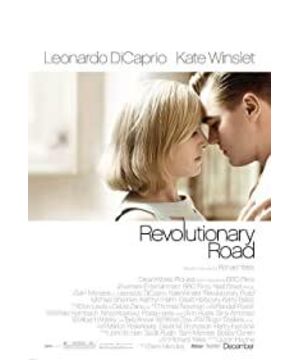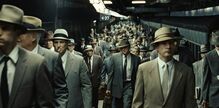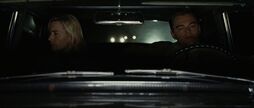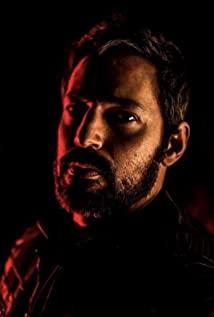Imagination. Even if you haven't seen a certain movie, the world presented only through words can still provide a unique visual experience. If you happen to forget there is such a scene, or remember it completely, imagining it in the face of organized language is slightly different. It's amazing, but it's not a movie, it's just words, descriptions, not even pure literature.
I like literature, I like movies, especially certain scenes, I like to write about them, they are beautiful, and it is a delightful experience to write about them, as if I am telling, and as if someone is really listening, in Look, imagine.
The revolutionary in the film is Aibo. She once brought hope to the revolutionary road and the people here. Like an idol, she is different and amiable, but she also tore it all down in a negative way. Her so-called revolution is closer to struggle, and the way of revolution is to get closer to the truth step by step. She once thought she had an insight into life, but she ruined her life because of it. Is she wrong? She just wanted to take a chance. Why did she want an abortion? Because it blocked her plan, the great and crazy plan, or this unborn child became an excuse for her once-loved person to reject her plan, and it was the culprit that once again caused her to fall into worldly life, so she did not hesitate to It doesn't matter at all costs, even sacrificing yourself.
"Revolutionary Road", like most movies, only captures a fragment of the character's long life, interprets it, or just describes it, without seeking any answers or giving any conclusions, perhaps this fragment is just based on a true prejudice , or maybe the death in this segment happens to deprive the character development. The narrative of a movie is musical, the picture is part of the rhythm, and the story is the same. It may be beyond your expectations, or it may never escape the stereotype. Everyone wants to be new and change, and they want to choose once, but in fact still It's like that, it's just something you don't recognize that already exists.
-= a little lube for negativity =-
If "Titanic" is an anecdote or even a romantic legend about love witnessed by a group of people, then "Revolutionary Road" is obviously a storm of inner turmoil interpreted by two old partners who have been separated for many years. The former is rich in publicizing some classics in the form of Facebook, and makes a lot of tears and money, while the latter advertises the principle of middle-class hard life and self-loyalty, obviously burdened with more profound speculation, and the film is not naive. Let everything surrender to the audience's good wishes, but push the collapse to the cliff, exhaust the limited space to dig the most indescribable emotional war between husband and wife, and the film is full of verbal violence, doing everything possible to hurt people, and each other. Body comfort is just a short-term adjustment between the screams. The people who love each other run and crawl in different directions, constantly dodging and compromising between contradictions, but they never get peace until one party uses a negative way to instantly collapse the story.
The meaning of compromise that can be interpreted by the flow of life is often extremely smooth, like the effect of anesthesia. In the first 10 minutes of the film, the transformation of the two people's identities is completed, as well as the first dispute that maintains the tone. Every time it deepens, develops, completes, and becomes even more vicious, more unthinking, from complaining to humiliation, intensifying. I don't know how the couple felt when they watched this movie. Maybe they were not so intense. The movie extracts the essence and intensifies. Not everyone has the chance to win the prize, but it does show the specificity from a paranoid angle almost perfectly. The face of a lover in a certain period of fantasy is also a topic I am interested in.
All sweetness is only superficial. Only in the face of disputes or potential contradictions can people's reflected state reveal their relationship with each other, and the banging sound of gunpowder can only give people a roaring, deafening, breathing arrangement in time. It is the elastic art of such short-revealing films, like the flirting and flirting in top erotic movies, how to adjust the proportions, how to follow the rules, how to be unfinished, when to use body, when to use language, and when to use empty mirrors, this film and "Love" Lost in June Flowers are all worthy of reference. In terms of diagonal play and role transformation in a limited space, "Revolutionary Road" undoubtedly gave a full score. Diagonal play is the most stage-like paragraph in the film. It is a gesture that has nothing to do with the plot and is full of formality. The arrangement of camera positions and the expression of light in close-up are particularly important for the expression of human emotions, and are also inherently related to picture photography.
-= A Few Affairs=-
Zoe Kazan's typist looks a bit like Maria de Medeiros, or maybe it's just my delusion, since her debut at 11 minutes, the timing of her appearance and the shyness of this delightful typist in the elevator speaks volumes She only appears as a reconciliation of the conflict between Frank and Aibo, and she is also the most unsustainable branch of the film. Compared with the rest of the film, her portrayal is obviously a bit sloppy, but for Frank, this episode about her does make him more three-dimensional.
Maureen is Frank's bright spot outside of marriage, and an important role that allowed him to regain his pride in the early stages of his transformation. For this reason, this person must be portrayed as a simple, kind, and even a little silly girl. Why didn't she show any displeasure in the face of Frank's obvious motives, and why didn't she disrupt the situation and create a more squalid external environment for the film? The director and screenwriter just wanted to present the naked and irresistible factors of unrest in marriage, without the slightest intention of slandering or demeaning any of the characters. All disputes are natural and bloody, but full of apologies, even heartfelt. Guilty.
The characters don't want to be so intense, but when the emotions arrive, you must have a sense of it; the third party can obviously be out of control, but he uses the least amount of writing and ink to deal with it in the film, because the role of this line is always to let Frank find confidence , find yourself, and go back to the grand dispute to accept the sanction of fate. And Maureen is also always lovely. She has no temper or even a more particular character. She is full of sensibility and emotion, and it is like a dandelion that is easily blown away with the development of the story.
Zoe Kazan, who plays Maureen, comes from a family of screenwriters. Several powerful plays such as "Memoirs of a Geisha", "Austin Book Club" and "The Curious Case of Benjamin Button" are all written by her mother. Reversal of Fate" or an Oscar nomination, his grandfather was famous at an early age. Good luck to her.
-= Fantastic role reversal=-
Frank turned from a eloquent young man with years of mediocrity to being considerate to his wife. At this time, he was a good husband who accommodated his wife. He was provoked by Aibo's negative and even angered behavior, and he spit out the complaints in his heart. Quick, at this time he was a runaway strong man; Maureen let him get back to the state of talking and laughing back then, and was able to be reborn with a suave and suave, so that he could devote himself to Aibo's treacherous emotionalization; Maureen had a relationship and drove home, at this time, he was a down-to-earth husband who felt guilty for his wife; and then he faced his wife who had been waiting for his return and dressed formally. The lucky man who lost and regained tenderness and intimate care was overjoyed. These five transitions have had their ups and downs, as well as nuanced ones. Not only that, but Aibo's disparate attitude made him even more remorseful, and the wild plan she announced confidently next even made him fall into a state of less than ecstasy and more than absurdity, and at the same time uphold the unbelievable and impossible. Understanding is hard to resist, and deep down, it just goes with the flow and goes with the flow.
Yesterday was a complaining office worker, today is a quasi-free man whistling, refreshed and unscrupulous; yesterday was an affair with a guilty conscience, today is a cuckold who does not know the secret; yesterday was depressed Depressed man, today is a new good man who loves his wife and son. The director has put a lot of effort into the transformation of the character's inner world, the incentives are sufficient, and no traces are revealed. It is as delicate as a memory inserted quietly in 22 minutes and 19 seconds, and it fits perfectly. Children who appear and disappear at the right time have an immediate effect on the release and intensification of the conflict between husband and wife. Musical changes are very helpful for expressing the state of the characters, and there are countless scenes such as carriages, bedrooms, and offices. In a limited space, nearly ten role transitions have been completed, and none of them are exactly the same, and they are not monotonous at all.
-= With the power of supporting roles =-
At 17 minutes, Helen, played by Kathy Bates, pretended to taste coffee as if nothing had happened. Her unspoken thoughts were really endearing. In fact, although she was full of gold for her son, it was still difficult to hide her subjective feelings for him. Bottomless worry. Casey Bates plays Helen, a clumsy but enthusiastic woman, with ease and precision, except that at 17 minutes and 54 seconds, the camera is shooting back and forth, and Aibo is in front of her body, so she looks directly to the left of the screen. Reasonably, looking to the right side of the screen means talking to herself, but when the camera cuts to her, she is talking to herself, and then after a brief look at Aibo, she continues to avoid and talk to herself. From time to time, her eyes were facing the camera for less than a second, and then hurriedly flashed to the right side of the screen, there was a risk of a technical error, causing this discomfort, it should have been switched to the selected editing point at 17 minutes and 54 seconds. Not suitable, it is worth scrutinizing.
Although the performance of the old woman is commendable, but if it takes the limelight, it is still far from Michael Shannon. Michael Shannon plays a mentally ill person, but his performance is sarcastic and sarcastic, with a bit of a radical version of Forrest Gump. The actor's size and face, as well as his slightly ignorant eyes, make people very stressed. He chokes when he speaks, and has a tendency to pounce on and bite people at any time; in addition to activating the atmosphere, he is also capable of intensifying the arduous task of intensifying conflicts.
The arrangement of several reactions is very ingenious and has a strong explanatory effect on his state. When he first came to Frank's house, Helen and his wife repeatedly tried to stop him from talking nonsense and even behaving badly, and he was asking too much. When asked, he didn't notice Helen's uncomfortable expression; when he brought up the lawyer at an inopportune time, let Mr. Helen eat her sandwich without interruption; then he discussed the murder case, ignoring Mrs. Helen's dramatic monologue, and then He tapped his index finger on his lips and persuaded her to shut up; as he defiantly responded to Frank's response that he found work boring, he began impatiently slapping the old man's legs while facing Mr. Helen's interruption. Laughter continued his taunting; finally, when he learned that the good family, whom the Helens had regarded as a model, were about to move away, he began to laugh extremely loudly, basically ignoring the old people's dissuasion. On the second visit, the first dissuasion was interrupted by editing, and there was no positive performance; and when John stood up to be unreasonable and was scolded by Mrs. Helen, he even threw his hand in her face; but then Frank The explanation to Mrs Helen after the gaffe turned out to be swearing; in the face of John's intensifying humiliation, he almost resorted to force. This step-by-step comparison not only shows the escalation of the situation through John's reaction, but also emphasizes that Frank has lost his mind at this time, and is even more unable to control his emotions than a psychopath and take responsibility for his words and actions.
On the second visit of the Helens, John learns that Frank has abandoned the crazy plan he once admired, so he blames Frank indignantly, showing no mercy, and the enraged Frank avoids all the things he proposes The embarrassing question was replaced by a personal attack on the patient. He thought that this would prevent the madman from continuing to challenge his dignity arbitrarily, but he never wanted to offend Helen and his wife. To make matters worse, John had the same attack, cadence and frustration. , made his words more explicit, more low-key, more morbid, and more impeccable, and even pointed the finger at Aibo under the emotions of unease and resentment. So this visit turned into a farce, and it was enough to cheer up the coming storm, and John's constant sarcasm about the child made Aibo's embarrassment and anxiety even more.
After the Helen family left, war broke out. In the quarrel, the two released unprecedented energy, and every word tried to kill each other - ridicule, self-deprecation, self-denial. A terrified Apple threatened Frank not to touch her or she cried, and she really did, she even ran into the woods alone in a panic. Frank asked her why, but didn't know either, she just wanted space to think and didn't need him anymore.
So far, the film has dedicated the most intense dispute between the two, and it can be expected that in the next 20 minutes or so, everything will be very calm, but it will be even more desperate. Frank was too naive, he underestimated a desperate revolutionary who could do anything at all costs, and he didn't have the energy to appreciate how Aibo's lonely world collapsed and destroyed in despair.
However, no one is to blame, and no one is to blame.
There is only fear, and the peace after fear.
-= Bunts of emotional paragraphs=-
When Frank left Maureen's place, Maureen's expression was indescribable, some joy, some disappointment, it was hard to describe what state it was The technique of using a fixed camera to show subtle emotions for 3 seconds has repeatedly appeared in secondary characters. For example, when Helen learned that Aibo readily agreed to her mentally ill son to visit her house, she was excited, emotional, and somewhat inferior. ; and the moment of embarrassment, sadness and strength on her face when her neighbor Millie waited for her husband Xue Bo to be alone in front of the mirror after she left the house. She saw that although her husband disliked her for being fussy and flattering, she still pretended to love her. It looks like, she sees that more often her husband accepts the status quo because he has no choice, and sees how fragile the superficial harmony based on everyone's tacit acceptance of worldly life is. She is not stupid, or even extremely sensitive, she knows everything but not. To put it bluntly, she was so strong that it was possible to stage such a touching scene at 40 minutes - when she learned that her husband did not do stupid things because of the absurd but enviable plans of the neighbor's family, she looked so relieved, The state of weeping with joy is very immersive, and it can't help but make people feel distressed. And Xue Bo's stunned appearance was shocked, which further contrasted the hidden tragedy of life, making this scene full of power and can be called a classic.
In this kind of sad life that looks like torment, everyone is wandering and suffering. When Xue Bo was ignored by the children, he chose to come to the backyard to look out - the clouds were light, the trees were shady, and there was a place there - that was the Frank family, we may speculate that whenever he encountered No matter the depressing things in life, he will come here, look with this kind of eyes, let the wind soothe his emotions, and let that unspeakable emotion comfort him a little. At the end of the film, he comes here again. If the first time means Xue Bo's unattainable vision and escape from the cruel life, then the last time becomes a long dispersion of the disappearance of the loved one. He told his wife to stop talking about the Franks, more like telling himself that the dream will always dissipate, like never before, the attachment to the idealist will disintegrate in an instant with the disappearance of life, and the reality is waiting He got stronger. Xue Bo hid in the corner of the coffee machine and sobbed alone after the accident of Zhi Aibo, and then he casually gave the coffee to the anxious Frank, so that no one could see that he was in the same pain as Frank. His feelings for Aibo come from the heart, are introverted, pure, accidental, do not ask for anything in return, and even become an extravagant hope, so he can grow up because of this, and it is also doomed that Frank cannot get out of Aibo. The shadow of death.
Frank probably spent his whole life wondering why, what happened, who hurt who, when did it start, what went wrong with everything he was after, or what was the right thing to do, in order to avoid disaster , in order to prevent the tragedy from happening, and to make positive efforts when it can still be salvaged. But maybe it's still the same after all over again. In the end, he can really only tightly hold on to the time he spends with the children, enjoy success and wealth, cheers and laughter, but sit alone by the swing, waiting, staring, Smile, ponder over the absurd but sincere plan that Aibo once proposed, draw a prison in despair and self-blame, so as not to be hurt forever.
-= is the invisible part =-
People can pretend, lie, remain silent, and conceal, but they are always thinking, weighing, and trying to make choices, which can lead to unforeseen and inevitable tragedies. Frank chose to be a successful person and a career, thus ignoring Aibo's sacrifice and her abnormal mental condition. He is more and more living in his own world, just like Aibo before, when she finds out that it was her willfulness that suppressed Frank's talents and dreams, she feels heartfelt guilt, but this is premised on her accepting her own failure. So she wants to release Frank, "one more life", and they both live one more time for each other, no longer fettered by stupid worldly life, and even she has to sacrifice her time to work in exchange for her husband's freedom. She intends to repay, to make up, to take this opportunity to heal herself.
Whether Able is well thought out or insane; whether Frank really understands Able's wishes, or just goes with the flow. They seem to be communicating, but until the end, Aibo is still willful, wishful thinking, and persecutory delusional; Frank still chooses to protect himself with anger and justify himself with subjective feelings. So, are their efforts in vain, and haven't they each made any progress? Why is the ending so unbearable, and why is it more disintegrating? In other words, why did this happen, and what was the situation in the past.
"Hopeless emptiness," Frank's original words. Aibo found it, but did Frank really find it? It is also possible that the "hopeless emptiness" that Ai Bo calls it is not consistent with what Frank is referring to. Aibo felt the barrenness thoroughly, and tried to make Frank discover it too, but Frank defined something else, he longed to succeed, even in this "hopeless emptiness" Can also happily deal with it. Frank the first time he said this, the Frank when the Sheppards announced their decision, and the Frank who later decided to work hard were not fundamentally different, just that he hadn't really realized that he wanted to What is it—anything, but not a ludicrous plan. However, Aibo was eager to reform due to excessive hesitation and fear. When she clearly realized that the Frank she knew was a stranger, she was already embarrassed and had no strength or willingness to make any further efforts.
As John said, not everyone has the courage to admit a well-known thing. And we always coerce the other person to admit it while avoiding it. Aibo faced it calmly, but she was forcing Frank to change as naked as she did, becoming a reborn superman, detaching from the existing world and embracing another possibility. Because in her heart, they are one person, and she wants them to choose and change together. But Frank was running away, because he didn't know, he didn't think clearly, so he used the child's question to coerce Apple into admitting that she was sick, crazy, and unreasonable. This finally made Aibo realize that maybe they were just two people, each with different pursuits, and no one could compromise for the other. The death of the changemaker, the death of the idealist, the death of the mathematical paranoia, is the same, they are indomitable, they are regarded as absurd by reality, and they fight against the absurd reality until they find themselves alone. In battle, he was suddenly defeated by unparalleled loneliness.
The film begins with 99 minutes of Apple watching Frank, and it comes to an end. With a ray of early morning light, the decisive tragedy comes calmly at this time. The style of processing this image reminds me of Mulholland Drive and The Elephant, the simple space and composition, the bland movement and movement, but the noise echoing in my head, how much I want to see the final scene of the film Like Mr. Helen, slowly turn down the volume of the hearing aids to stay away from this unease, and just watch on the sidelines of those who don't really understand or care what's going on, watching those lips move and talk to themselves, as if None of this has anything to do with me, and it will never happen to me.
That way, there will probably be no worries.
2009.02.17 Beijing
View more about Revolutionary Road reviews











